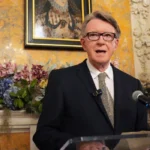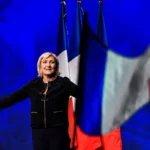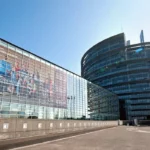In the year 2018, a revelation from that time has resurfaced, shedding light on the close ties between British diplomats and Saudi Arabia’s public relations efforts. In a startling disclosure, it was revealed that a senior British diplomat, Jolyon Welsh, worked for the firm responsible for a multimillion-pound Saudi PR campaign while still being employed by the Foreign Office. This revelation came just as Saudi Arabia’s influential Crown Prince, Mohammed Bin Salman (MBS), prepared for a state visit to Britain. This article delves into the details of this revelation and its implications, as well as the broader context of Saudi Arabia’s controversial actions in those years.
Welsh, who had held various roles within the Foreign Office, including deputy head of Middle East affairs, was granted special unpaid leave back in 2014 to assume the position of a senior director at Consulum, a communications firm. This information, uncovered by the Bureau of Investigative Journalism, raised questions about the extent of the ties between British diplomats and private firms. Notably, Consulum was founded by former executives of Bell Pottinger, an agency that faced a scandalous downfall in the previous year due to its involvement in a campaign for South Africa’s Gupta family.
One of Consulum’s prominent clients happened to be Crown Prince Mohammed Bin Salman, the de facto ruler of Saudi Arabia, whose state visit to the UK was scheduled to begin shortly. However, the visit was not without controversy, primarily stemming from Saudi Arabia’s military campaign in Yemen. The Saudi-led coalition forces had been implicated in the deaths of hundreds of civilians and, at one point, sealed off Yemen from humanitarian access, exacerbating the cholera crisis that had afflicted thousands of Yemenis. According to the United Nations, the Yemen conflict had claimed the lives of over 9,000 individuals, the majority of them civilians, and left more than 52,000 people injured since its onset in March 2015.
The Bureau’s report suggested that Jolyon Welsh may have had some involvement with the Saudi account during his tenure at Consulum. This revelation highlighted the intricacies of the relationship between London and Riyadh, as permission for diplomats to work in the private sector was generally granted if it was “directly and closely related to a specific FCO area of interest [and] in line with our strategic priorities,” according to the Foreign Office.
Lloyd Russell-Moyle MP, a member of the Commons committee on Arms Export Controls, expressed concerns about this revelation at that time, stating, “It’s one thing for the Foreign Office to provide political cover for the Saudis’ assault on Yemen, which defies all notions of proportionality and which I believe in several cases constitutes war crimes. It’s quite another for the FCO to have lent its staff to a company working for the Saudis’ PR operation.”
In a surprising turn of events, mass protests against the Crown Prince’s visit were anticipated to take place at Downing Street. To counteract this negative publicity, advertisements in newspapers, billboards, and even trucks adorned with positive messages about the Saudi leader had flooded London. These trucks displayed his image alongside the hashtag #WelcomeSaudiCrownPrince, while digital billboards along the M4 from Heathrow conveyed the message that “He is bringing change to Saudi Arabia.”
Ironically, an advertisement proclaiming “He is empowering Saudi Arabian women” appeared on The Guardian’s website next to an article by shadow Foreign Secretary Emily Thornberry, who criticized the government for its apparent disregard for human rights during the three-day visit. This juxtaposition highlighted the complex web of relationships and controversies surrounding Saudi Arabia’s PR efforts and its ties to British diplomats, all against the backdrop of the year 2018.






